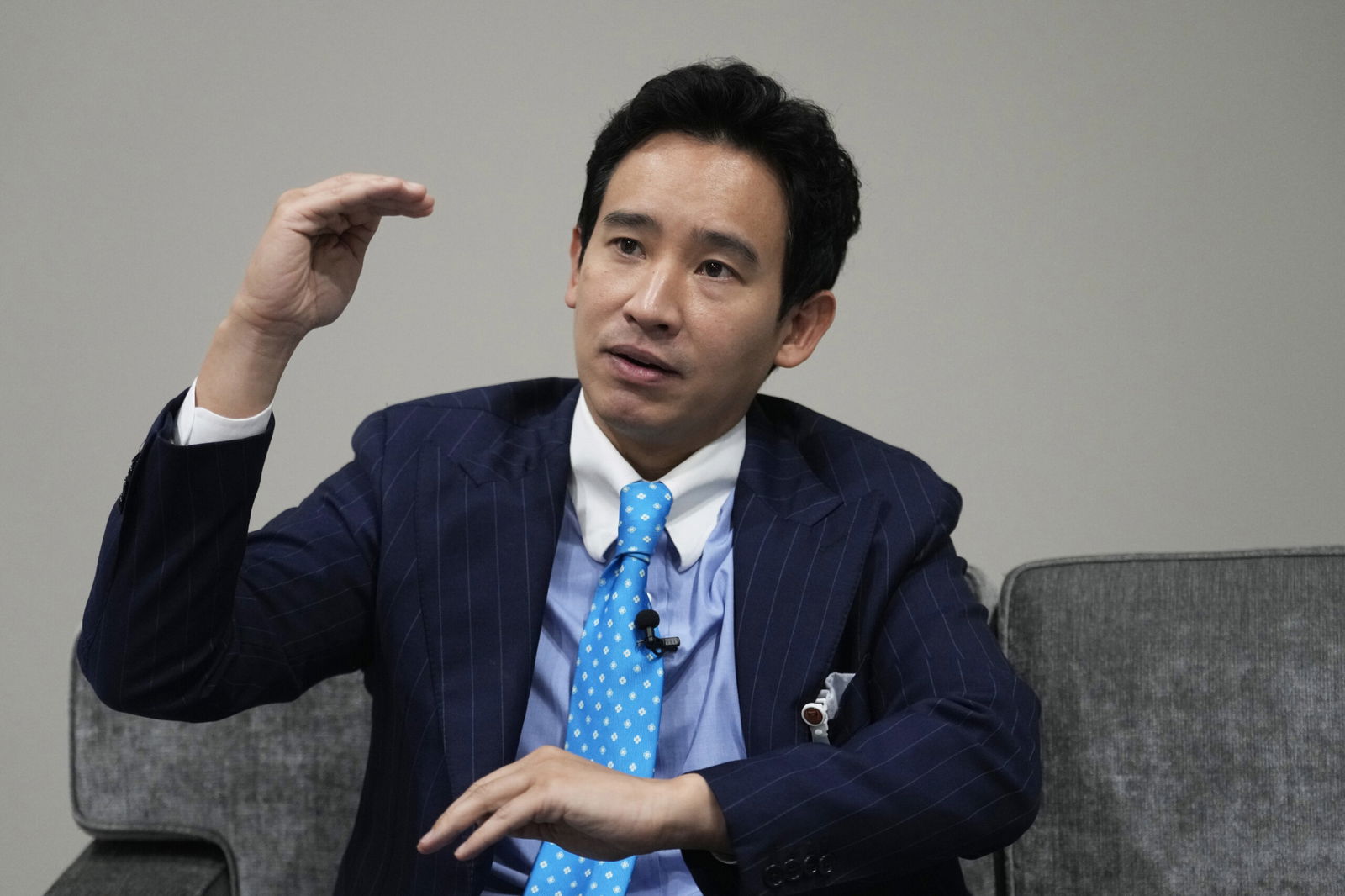Around the World briefs

By Associated Press
Thailand’s progressive Move Forward party might be dissolved, but its former chief remains hopeful
BANGKOK | The charismatic Thai politician who led his young, progressive party to a stunning general election victory a year ago is urging supporters not to lose hope, even if the party is disbanded by a legal order.
Thailand’s Constitutional Court will rule Wednesday on whether the Move Forward Party violated the constitution by proposing to amend a law that forbids defaming the country’s royal family. A petition to the court requested the party’s dissolution and a 10-year ban on political activity by its executives, including former chief Pita Limjaroenrat.
Move Forward won the most seats in the 2023 election, but was blocked from taking power and now heads the opposition. Pita was denied the prime minister’s job by the military-installed Senate, a power it was given in the constitution adopted in 2017 under a military government.
The legal action has drawn widespread criticism as it’s seen as part of a yearslong attack against the country’s progressive movement by conservative forces trying to keep their grip on power. While Pita remains confident of the arguments that the party submitted to the court, he said in an interview with The Associated Press that he understands why people assume the party would be dissolved.
Pita, however, stands firm that Move Forward will continue to fight to prevent that phenomenon from being normalized in order to achieve a full democracy.
“We’re fighting this not just because of my personal future or my party’s future, but we want to make sure that, if it happens, that Pita becomes the last person. The Move Forward Party becomes the last party that joins the graveyard of political parties,” he said.
Move Forward’s predecessor, the Future Forward party, was dissolved by a Constitutional Court ruling in 2020 for allegedly violating election laws on donations to political parties.
Thailand’s courts, especially the Constitutional Court, are considered a bulwark of the royalist establishment, which has used them and nominally independent state agencies such as the Election Commission to issue rulings to cripple or sink political opponents.
The dissolution of Future Forward, whose promises of reforms were particularly attractive to the young generation disillusioned by yearslong military rule, further highlighted the struggle between the progressive movement and conservative forces in Thailand. It was one of the triggers for youth-led pro-democracy protests that sprung up across the country in 2020. They openly criticized the monarchy, an institution long considered a linchpin of Thai society and untouchable.
Insulting or defaming key royal family members is punishable by up to 15 years in prison under a law also known as lese majeste, and usually referred to as Article 112 of Thailand’s Criminal Code. Those protests led to vigorous prosecutions under the law, which had previously been relatively rarely employed. Critics say the law is often wielded as a tool to quash political dissent.
Move Forward, formed as a new home to lawmakers of the dissolved Future Forward, campaigned for an amendment to the law in the 2023 election. That and the introduction of other democratic reforms carried over from its predecessor landed it in first place in the election, a victory indicating that many Thai voters were ready for change.
Pannapha Hatthavijit, a 27-year-old market vendor in Bangkok, has been a loyal supporter of Move Forward since it was still Future Forward because she wanted to see something new in Thai politics.
She said she could sense the party’s rising popularity from people around her, and to see thousands of the especially young crowds joining one of the party’s campaign rallies in Bangkok was “so invigorating” for her, so much so that she predicted the party’s victory that came as a surprise to many.
However, the party was denied power after the Senate, installed by a military government that ousted an elected government in 2014, refused to agree to its then-leader Pita’s selection as prime minister. Senators said they opposed Pita because of his intention to enact reforms to the royal defamation law. The party was later removed from a coalition formed with the now-ruling Pheu Thai party and is currently heading the opposition.
These developments show that Thailand is more of a “semi-autocratic country” than a democratic one, said Thitinan Pongsudhirak, a professor of political science at Bangkok’s Chulalongkorn University.
“It means that you can have an election and people can vote, but after that the results (are) manipulated and subverted to serve autocratic forces and establishment preferences,” he said.
When the party failed to become the government, Move Forward voter Pannapha said she was dispirited and she would be disappointed all the same if the party is dissolved or Pita is banned on Wednesday. But that will not be enough to kill off her hope for change.
“Move Forward is not Pita. Move Forward is us, the new generation,” she said. “It’s not over yet.”
That is the spirit that Pita would like his supporters to keep alive. He said, if necessary, the party will ensure a “smooth transition into a new house” or a new party for the rest of its non-executive lawmakers.
He said if the verdict does not come out in their favor, people can be frustrated. He said however that his ultimate goal is that they channel that anger into votes at the ballot box to ensure they eventually win the war, even if they lose this particular battle.
“If they get rid of the party, they get rid of me, but people are still hopeful and returning to the ballots every single time, more and more and more, I think that’s when they lose,” he said.
Teen vies for record solo flight to seven continents to raise money
for childhood cancer research
GENEVA | A Chinese American teen is vying to become the youngest person to fly solo to all seven continents in a quest that also aims to drum up donations for research into childhood cancer.
Ethan Guo, who turned 19 last month, began his quest in May in Memphis, Tennessee. He made multiple overnight stops and visited seven countries to get to the Swiss city of Geneva on Tuesday, before jetting off toward Heraklion in Greece.
The plan is to cover 50,000 miles over 100 days with stops in 60 countries. He hopes attention to the journey will drum up donations and raise up to $1 million for cancer research, an ambition born of the Stage-4 blood cancer diagnosis for a cousin of his.
That prompted the tousled-haired teen to reach out to St. Jude Children’s Research Hospital based in Memphis.
“We came up with the idea of … how we can work on this together,” Guo said, “how we can make this world a better place.”
So far, he has raised about $20,000, but he’s convinced he will draw more donations.
A press handler for Guo showed The Associated Press an email exchange with an official at Guinness World Records Ltd. about the teen’s hope to become the youngest person to fly solo to seven continents. The London-based company did not immediately respond to an email from the AP seeking comment.
Guo started learning to fly at age 13, and four years later had his pilot’s license, but insurance companies balked at covering a minor for his adventure, so he had to wait. He has clocked 700 flight hours and flown to all of the 48 contiguous states in the U.S.
On the tarmac near Geneva airport, Guo said only about one in 10 of the companies he pitched to become sponsors actually came through.
Logos of companies large and small adorn Guo’s modified four-seater Cessna 182. Visitors can track his progress on the website flightagainstcancer.com.
Born in Tianjin, China, and currently living in West Palm Beach, Florida, Guo said he wanted to become a pilot to challenge himself. He foresees a career in business and tech, not aviation.
Guo’s parents were worried about his project and actively tried to stop him, forcing him to do it on his own with help from volunteers, sponsors and other supporters, he said.
He understands the risks.
“Through my experiences — like an engine failure on the very beginning of the trip … I was forced to face the fact that I could die at any point of the trip,” he said.
He’s made preparations like stocking the plane with cold-weather gear for Antarctica, a survival kit if he gets stranded in the desert, and an inflatable raft if he lands in an ocean.
“I’ll be lying to tell you if I wasn’t scared,” Guo said. “But every day I reaffirm myself. I say ‘This is what I believe in.’ (…) So I’m going to fight on until the very end.”
Hiroshima governor says nuclear disarmament must be tackled as
a pressing issue, not an ideal
TOKYO | Hiroshima officials urged world leaders Tuesday to stop relying on nuclear weapons as deterrence and take immediate action toward abolishment — not as an ideal, but to remove the risk of atomic war amid conflicts in Ukraine and the Middle East and rising tensions in East Asia.
They commented as Hiroshima remembered its atomic bombing 79 years ago at the end of World War II.
The memorial comes days after Japan and the U.S. reaffirmed Washington’s commitment to “extended deterrence,” which includes atomic weapons, to protect its Asian ally. That is a shift from Japan’s past reluctance to openly discuss the sensitive issue as the world’s only country to have suffered atomic attacks.
Hiroshima Gov. Hidehiko Yuzaki said nuclear-armed nations and supporters of atomic deterrence “deliberately ignore … the fact that once people invented a weapon, they used it without exception.”
“As long as nuclear weapons exist, they will surely be used again someday,” Yuzaki said in his address at the Hiroshima Peace Memorial Park.
“Nuclear weapons abolition is not an ideal to achieve far in the future. Instead, it is a pressing and real issue that we should desperately engage in at this moment since nuclear problems involve an imminent risk to human survival,” he said.
Hiroshima Mayor Kazumi Matsui said Russia’s war on Ukraine and the worsening conflict between Israel and Palestinians are “deepening distrust and fear among nations” and reinforcing a view that use of force in settling conflict is unavoidable.
The atomic bomb dropped by the United States on Hiroshima on Aug. 6, 1945, destroyed the city, killing 140,000 people. A second bomb dropped three days later on Nagasaki killed 70,000 more. Japan surrendered on Aug. 15, ending World War II and Japan’s nearly half-century aggression in Asia.
About 50,000 people at the ceremony observed a minute of silence with the sound of a peace bell at 8:15 a.m., the time when a U.S. B-29 dropped the bomb on the city. Hundreds of white doves, considered symbols of peace, were released.
Prime Minister Fumio Kishida, who attended the ceremony, said global conflicts and divided views over approaches to nuclear disarmament make achieving that goal “all the more challenging,” but pledged to do his utmost in pursuing “realistic and practical measures” to build momentum within the international community.
His critics say it is a hollow promise because Japan relies on the U.S. nuclear umbrella for protection and has been rapidly expanding its military.
Japan, the United States and other regional allies have been stepping up security cooperation in response to a more assertive China and the growing nuclear and missile threats from North Korea. Japan has sought stronger U.S. protection by its nuclear capability.
Many survivors of the bombings have lasting injuries and illnesses resulting from the explosions and radiation exposure and have faced discrimination in Japan.
As of March, 106,823 survivors — 6,824 fewer than a year ago, and now with an average age of 85.58 — are certified as eligible for government medical support, according to the Health and Welfare Ministry. Many others, including those who say they were victims of the radioactive “black rain” that fell outside the initially designated areas of Hiroshima and Nagasaki, are still without support.
Hiroshima officials called on Kishida’s government to do more to provide support and address their wishes.
The aging survivors, known as “hibakusha,” continue to push for a nuclear arms ban as they desperately campaign to have their effort kept alive by younger generations.
Cambodia breaks ground on a
China-funded canal and says it
will be built ‘no matter the cost’
PREK TAKEO, Cambodia | Cambodia broke ground Monday on a controversial, China-funded canal to link the capital Phnom Penh to the sea, despite environmental concerns and the risk of straining ties with neighboring Vietnam.
The $1.7 billion, 111 miles Funan Techo canal is planned to connect the country’s capital with Kep province on Cambodia’s south coast, giving it access to the Gulf of Thailand. Cambodia hopes the 328 feet-wide, 17.7 feet-deep canal will lower the cost of shipping goods to the country’s sole deep-sea port, Sihanoukville, and reduce reliance on Vietnamese ports.
The project highlights the outsized role that China plays in Cambodian politics and economy. Meanwhile, concerns remain about the potential environmental impacts of the canal, especially on the flow of the Mekong River, which feeds millions of people across six countries through its fish and the agriculture that it sustains.
The project has Vietnam worried, both about the effect on its Mekong Delta rice-growing and about Cambodia moving out of its orbit, said Nguyen Khac Giang, an analyst at Singapore’s ISEAS-Yusof Ishak Institute.
“There is a concern that most of the Cambodian exports might be diverted from the current route, crossing the Vietnamese border to Vietnamese ports and moving away from that to Cambodian ports,” he said.
But Hanoi has expressed its concerns quietly, if at all, Giang said. Given the “complex historical legacy” between Cambodia and Vietnam — despite strong bilateral ties, the two nations have a contentious relationship — Vietnam is reticent to openly criticize Cambodia lest it be seen as impinging on its neighbor’s sovereignty, he said.
Analysts say that the infrastructure project is in part an effort by Cambodia’s ruling elite to invigorate support for Hun Manet, who last year took over the wheel of government from his father, Hun Sen, who led Cambodia for 38 years.
The government declared Monday — also Hun Sen’s birthday — a holiday so Cambodians could participate in the “celebration in a joyful, crowded and proud manner.” Thousands of people wearing t-shirts with photographs of the father and son began gathering at the canal site, that was covered in Cambodian flags. Billboards promoting the economic benefits of the canal dominated the countryside.
The canal will promote “national prestige, the territorial integrity and the development of Cambodia,” Manet said, adding that the country had built bigger and more expensive infrastructure projects before. But this “historic” canal was different and had nationwide support, he said.
“We will build this canal, no matter the cost,” he said.
He emphasized that while the canal would be jointly built by Chinese and Cambodian companies, the latter would have a 51% majority share and thus maintain control. Deputy Prime Minister Sun Chanthol confirmed that the Chinese state-owned construction giant China Road and Bridge Corporation had landed the contract to build the canal.
The U.S.-based nonprofit Stimson Center has warned that the canal would cause “significant transboundary impacts to water availability and agricultural production in Vietnam’s Mekong Delta.” The region is where 90% of rice exported from Vietnam is grown.
The Cambodian government has dismissed these concerns.
Earlier in April, Vietnam had asked Cambodia to share information about the canal. “We have asked Cambodia to collaborate closely with Vietnam and the Mekong River Commission in sharing information and assessing the project’s impacts on water resources and ecosystem in the Mekong Delta region.”
Cambodia is a key Chinese diplomatic partner, helping dampen criticism of Beijing within the 10-member Association of Southeast Asian Nations, several of whose members, including Vietnam, are engaged in territorial disputes with China in the South China Sea.
China’s outsized presence can be seen in the numerous Chinese-funded projects, hotels and casinos dotting the Cambodian landscape. China’s state banks have financed airports, roads and other infrastructure built with Chinese loans. Nearly 40% of Cambodia’s over $11 billion in foreign debt is owed to China.
In June 2022, China and Cambodia broke ground on a naval port expansion project that has raised concerns from the U.S. and others that it could give Beijing a strategically important military outpost on the Gulf of Thailand. Hun Sen in 2019 reportedly granted China the right to set up a military base at the Ream Naval Base. He has long denied that, saying Cambodia’s Constitution prohibits foreign military facilities.
—From AP reports



